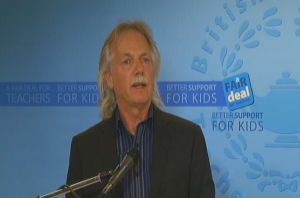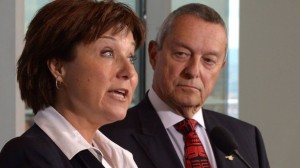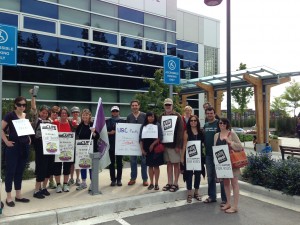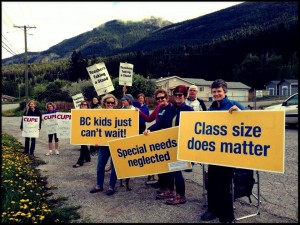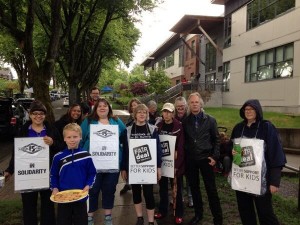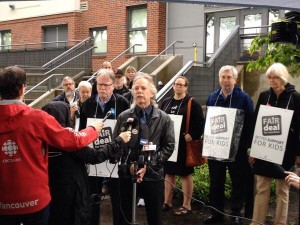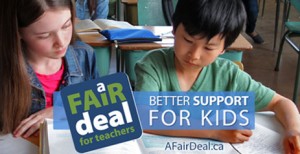17 June 2014
As leaders of British Columbia’s Labour Movement we speak with one voice today in solidarity with the 40,000 teachers in the province who are standing up for the rights of children to a quality public education by demanding a fair collective agreement.
It is becoming more and more apparent that, despite statements to the contrary by Premier Christy Clark, there is little desire by the B.C. Liberal government to bargain in good faith and end this dispute for the good of all.
The B.C. Teachers’ Federation has shown a willingness to find a path forward, putting forth significant changes that would have brought teachers and the employer closer to an agreement. But the government refused to even discuss them, and chose to move backwards instead of forwards.
Teachers want to stay in the classroom but they know how important it is to hold strong against the government’s assault on our public education system. Their fight is bigger than one union – they are fighting for the rights of all workers to be treated with dignity and for all children to have a solid start in life.
Christy Clark and the B.C. Liberals need to get the clear message from British Columbians that it is time for the government to respect the work of our teachers and the two court decisions, and negotiate a settlement in good faith. There is no need to let this dispute continue through the summer and into the fall. The time to settle is now.
We know that workers and parents across the province support teachers – they understand and respect the important role they play in our communities.
It is now time for all of us to take action. Demonstrations of solidarity with teachers are more important now than ever.
As labour leaders and parents we are calling on our members, and all British Columbians, to bolster the picket lines to ensure teachers know they are not standing alone, and the government knows we are a united movement.
Such acts of solidarity over the last two weeks have made a difference. Other unions, including 25,000 CUPE members, have been active on the picket lines – and as the teachers move into a full strike, we all need to play our part.
Write the Premier, the Education Minister and your local MLA. Tell Christy Clark to stop wasting taxpayers’ money on fighting the courts, and start investing in public education so that our kids have the best chance for success.
And join the rallies being hosted by the B.C. Federation of Labour and the B.C. Teachers’ Federation. A strong showing sends a strong message – both to the teachers of the province who need your support, and to the government who needs to hear your frustration.
As working people, public education has never been more important for our young people. Their success in finding meaningful work and in being active members of their communities is tied directly to a fully-funded public education system where all educational staff are respected.
We are all responsible for protecting that system now.
In solidarity,
Val Avery, HSA
David Black, COPE 378
Lynn Bueckert, BCGEU
Brian Cochrane, IUOE
Laird Cronk, IBEW
Robert Demand, UNITE HERE!
Victor Elkins, HEU
Mark Gordienko, ILWU
Mark Hancock, CUPE BC
Amber Hockin, CLC
Steve Hunt, USW
Jim Iker, BCTF
Bob Jackson, PSAC
Dusty Kelly, IATSE
Irene Lanzinger, BCFED
Ivan Limpright, UFCW
Lee Loftus, BC Building Trades
Gavin McGarrigle, Unifor
Cindy Oliver, FPSE
Bonnie Pearson, HEU
Karen Ranalletta, CUPE BC
Jim Sinclair, BCFED
Stephanie R. Smith, BCGEU
Joie Warnock, Unifor

 Follow
Follow
